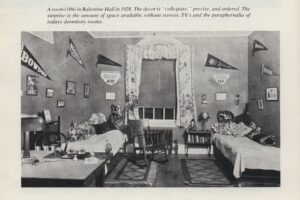Unconventional, that is the word that many Americans and global spectators use to describe the current presidency. “Assessing the First Year of an Unconventional Presidency” was the topic of this year’s Cohen Lecture at the University of Maine presented by the William S. Cohen Institute for Leadership and Public Service at the Collins Center for the Arts.
Maine native and Former Secretary of Defense, Cohen disclaimed that the lecture was more of a conversation between him, Andrew H. Card Jr., former chief of staff to President George W. Bush, and Ambassador Marc Grossman, former undersecretary of state for political affairs.
“There’s an unconventional president because he got elected unconventionally,” Ambassador Grossman said.
“He [President Trump] became a wake up call for Washington. He was voted in part because of so many people’s frustration that Washington was not paying attention to them,” Card said. “I have decided that I’m not going to be a cynic about Donald J. Trump, I want him to succeed. I moved from cynicism to skepticism, optimist skepticism.”
A good leader invests in other people to help him lead, and that is what Card believes the President to be doing. In Card’s opinion, the appointment of John Kelly as the Chief of Staff gave the White House the discipline it desperately needed. “He’s [President Trump] on a learning curve because he’s never been at the position of government, but now he’s a leader of the nation.”
Moderator Felicia Knight posed a question to the speakers about the President’s frequent use of the phrase “America First.”
“The idea that somehow, people before him didn’t put America first is wrong,” Grossman said. “How do I promote and defend America’s interests, people have been going to work with that idea every day.”
“Tell me what country says China second, India second?” Cohen added, referencing the idea that every country leader puts its nation’s interest as the top priority.
Cohen, who served in both the House of Representatives and the Senate, shared his worries about Trump’s message to the public.
“Can tweeting lead to something dangerous — yes. Anytime a word is spoken by the President and it’s ambiguous, it’s dangerous, there’s opportunity for miscalculation.”
It’s not only what the President does say, but also what he doesn’t say that worries Cohen. He gave an example of Trump’s criticism directed at United States allies and not directed to President Vladimir Putin.
“My opponent once said: “If the word is not spoken, it goes not unheard.” Not only what you say but what you don’t say goes with consequences,” Cohen said. He believes that Trump’s abnormal Twitter feed in conjunction with his criticism of the mainstream media can be harmful.
“Alternative, fact free universe puts us in a dangerous position where anybody can interpret anything to be truth,” Cohen said. “Governments depend upon having your trust in leadership and if we don’t have that, the world becomes a jungle.”
“Social media has changed the media,” Card said. He talked about the traditional media’s role as a gatekeeper, and how prior to the explosion of the internet journalists used several sources went through extensive filter stages to produce reliable content.
“If you just put news now, people won’t respond to it, so you put a little commentary. That impacts journalism which then impacts politics,” Card said. “People ask me what I missed the most as the Chief of Staff — I missed the real news.”
From the way the president treats members of Congress to his fondness for “tweetstorms,” and his taunting of everyone from the National Football League to North Korea, Cohen said, “President Trump has really rejected the norms in virtually every aspect of his presidency.”
In conclusion, Cohen reminded the audience why elected officials should do the job they do.
“When you say that you are a public servant, what does that mean? It means you serve only the people of the United States,” Cohen said. “That’s what we have to bring back for the people in the public service; not the commercial interest, not your own interest, but only the interest of the public.”
Card, who served under three presidents said: “As soon as you accept the job, you don’t work to please the President, you serve the office.”
The biennial William S. Cohen Lecture Series brings prominent public figures to UMaine for a public discussion of current issues in U.S. and world politics. Past speakers include Secretary of State Madeleine Albright, U.S. Attorney General Eric Holder Jr. and journalist Bob Woodward, most famous for his work with Carl Bernstein on reporting the Watergate Scandal.









